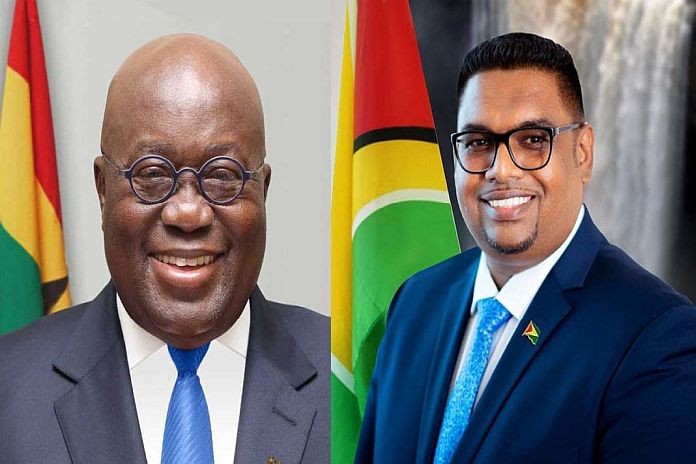By Ray Chickrie
GEORGETOWN, Guyana – A large private sector delegation from Ghana arrived in Guyana on Sunday met with the president of Guyana, Mohamed Irfaan Ali; vice-president Bharrat Jagdeo and his Cabinet. The Ghanian delegation will be in Guyana for four days to explore investment opportunities.
The office of the president said: “The visiting private sector delegation from Ghana are in Guyana to follow through with discussions which commenced on the sidelines of the 76th United Nations General Assembly meeting in New York, where president Irfaan Ali and Ghanaian President Nana Akufo-Addo held talks on possible areas of cooperation and investment between the two countries.”
According to a press release from the office of the president, the Ghanian delegation included a number of representatives from the education, agriculture, housing, financial services and infrastructure sectors.
The visiting delegation representing several private sector organisations in Ghana, including West Coast Gas Ghana Limited held discussions with a number of government ministers and local private sector entities.
A team from the ministry of finance of Guyana also had a separate meeting with the Ghanian delegation. On Tuesday, the Ghanian delegation explored investment opportunities in the agriculture sector during a meeting with the minister of agriculture, Zulfikar Mustapha and his team.
Recently, vice-president Bharrat Jagdeo headed a delegation to Ghana for discussions. Vice-president of Ghana, Mahamudu Bawumia, is expected in Guyana soon and next year president Nana Akufo-Addo will visit Guyana.
Guyana plans to tap into the experience and expertise of Ghana’s oil and gas industry. “We are going to utilise the skills of the people from Ghana to assist us to create the architecture for the management of the industry. We have had a lot of consultants from northern countries and elsewhere, but it is time that we actually go to a country that have had to build institutions from scratch in a relatively short period of time, and I tell you that they have enormous experience at doing so,” the vice-president said while he was in Accra a few weeks ago.
Earlier this month, officials from Ghana were in Guyana to assist with the creation of a Local Content Bill for Guyana’s emerging oil and gas sector. In May, the Guyana Oil and Gas Energy Chamber (GOGEC) and Ghana Upstream Petroleum Chamber signed a Memorandum of Understanding for cooperation between the two organisations.
Guyana is a small country with a small workforce will have to import foreign labour. The majority of the Guyaense workforce did not complete high school. The government has embarked on an action plan to educate the population so that they find opportunities in the oil and gas sector.
Guyana’s population is just under 800,000 people. The two dominant groups, East Indians make up about 42 percent of the population and Afro-Guyanese about 30 percent. Afro-Guyanese make up over 85 percent of the public sector employees.
Vice-president Jagdeo said that to avoid the overheating of the economy because of Guyana’s limited capacity, while the demand is “massive,” the government will have to import foreign labour.
“We have a small population, limited labour force; we’d have to be careful, at some point in time in the future I think we’d hit full employment so we may have to consider an active immigration but careful immigration policy. That is how you expand your capacity so when demand grows and you have limited capacity, then you have overheating,” he said.
Guyana plans to open an embassy in Accra in 2022. These two countries share historical ties dating back to the era of trans-Atlantive slavery to the period of decolonization. Guyanese leaders joined the international campaign for the liberation of Ghana, and other African countries. One of Guyana’s main liberation leaders, Kofi was of Akkan origin.





